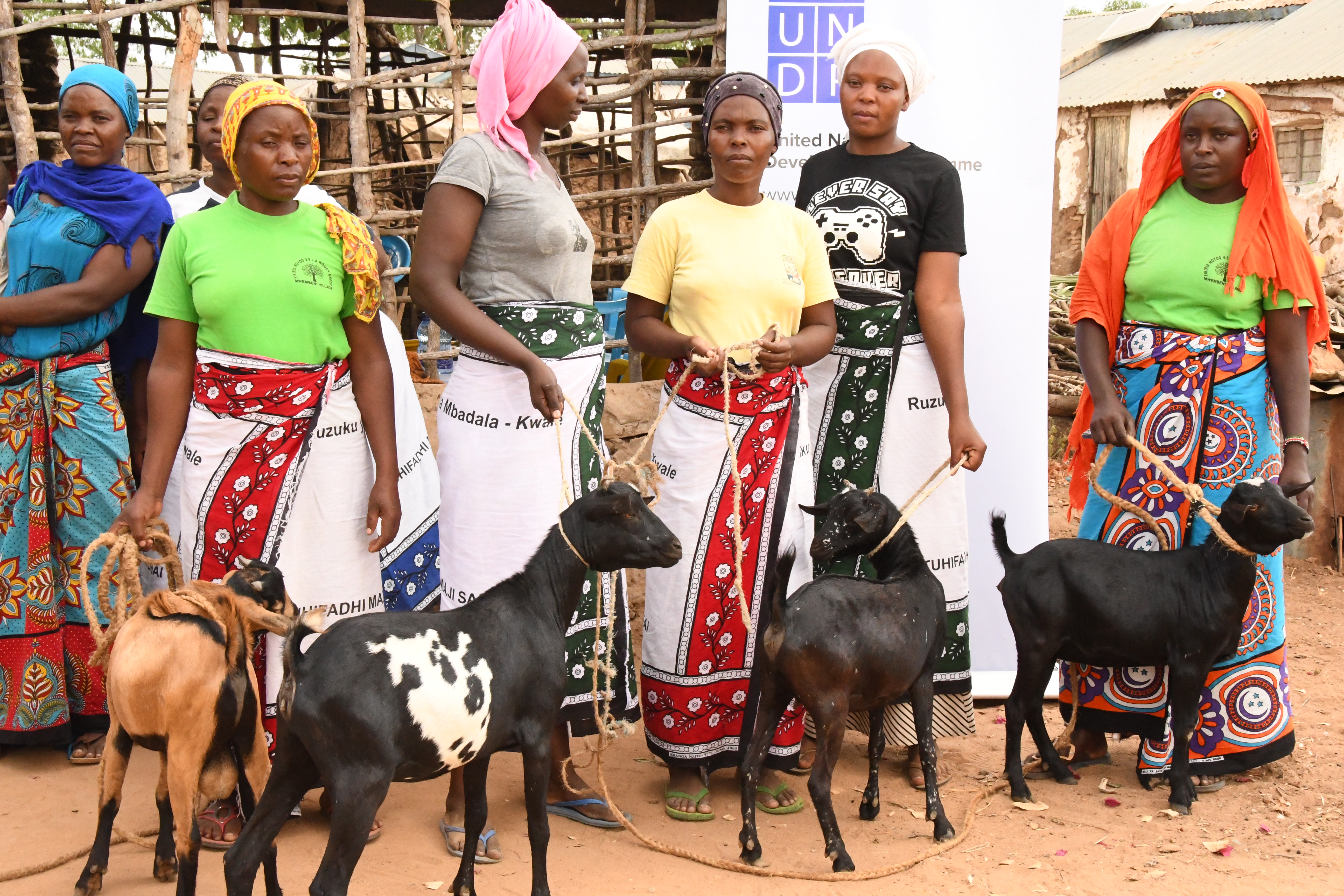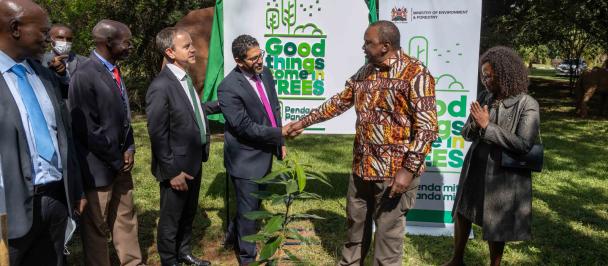Women from the Fikiria Moyoo Women Group in Samburu, Kwale County, who received a grant of 70 goats through UNDP with support from the Government of Japan. (Photo: Christabel Chanda-Ginsberg/UNDP Kenya)
Kenya and its’ neighbouring countries in Eastern Africa are prone to natural disasters such as drought, floods and most recently locust infestation. These disasters have increased in frequency and intensity mostly exacerbated by climate change which has contributed to the depletion of natural resources and the destruction of livelihoods for the already vulnerable communities. As a result, this has deepened the vulnerabilities and poverty levels of communities leading to increased inter-communal conflicts as well as radicalization mostly in border regions.
To reduce these vulnerability and poverty levels, UNDP through funding from the Government of Japan has been working with the National Drought Management Authority to assist vulnerable communities that are susceptible to disasters. Key interventions put in place have been exploring additional livelihood sources that would cushion these vulnerable communities from the adverse impacts of disasters including conflicts through skills building, mentorship sessions and establishment of enterprises that provide an entry point into the mainstream economy. To achieve this, UNDP since 2016 has implemented four (4) projects in the coastal region:
- Enhancing stabilization and resilience of communities affected by violent conflicts and disasters (2016/2017).
- Capacity development for peace and disaster management along border areas (2018/2019).
- Supporting an inclusive and multi-sectoral response to COVID-19 and addressing its socio-economic impact in Kenya (2020/2021).
- Stabilization and recovery of communities affected by violent extremism, conflicts, and disasters in Kenya project (2020/2021).
These projects have been focusing on women, youth and people living with disabilities who are the most vulnerable during disasters. Working with partners, UNDP has explored ways of reducing their vulnerabilities by enhancing their capability to cope with new and unanticipated disasters. In this light, the UNDP resilience team visited community groups in the coastal region (Kwale, Mombasa, Kilifi and Tana River) to document and assess the cumulative impact of these projects on the communities.
During the visit, one of the groups visited was the Fikiria Moyoo Women Group in Samburu, Kwale County which received a grant of 70 goats to breed and sell. Briefing the team during the visit, Aisha Mlango Katana the Chairperson for the group pointed out that “the grant of goats that we received from UNDP has boosted our table banking business with which each member of the group has been able to access loans to start a business. For example, the group has supported me with Ksh 50,000 to pay for school fees for my daughter who got admitted at Kilifi Teachers College.” She further added that, “the cohesion and hard work of Fikiria Moyoo women has motivated our husbands and older children to form their own savings groups where we have been mentoring them.”
Youth are a key catalyst to ensuring stability and enhancing resilience to natural disasters mainly caused by climate change-induced shocks. Enhancing the resilience of youths in disaster prone areas through providing alternative sources of livelihoods is key. Meeting some of the youth groups supported was a highlight of the mission to the coastal area. Among the youth group met was the Gombato Youth for Change Community Based Organisation, Samba Sports Youth Agenda and Mombasa WhatsApp Youth group. These youth groups and others were provided with catalytic capital in the form of start-up equipment that has further enabled them to establish businesses.
Briefing the team, the leader of the Mombasa WhatsApp Youth Group, Hamisi Katana Karisa mentioned that their group, which offers printing services, received support from UNDP in 2021 in the form of a head press, plotter cutter and screen printer. Hamisi Katana Karisa mentioned that “before the funding from UNDP, we used to print around 50 shirts in a month due to the slow printing. Since we received the machines, we are now able to print over 5000 t-shirts in a month which we could not do before, which caused us to miss out on business opportunities.” He further added that, “at the end of the month the money collected is used for rent for the printing shop and to buy other equipment needed. The rest of the money remaining is distributed among the 19 members to help them with their various needs.”
Youth groups that have been supported through these initiatives are now earning additional income in a month and have created credit systems among themselves to allow group members to access interest free loans to expand individual businesses. These activities and support accorded to youths have contributed to making at-risk youth in these communities more resilient to disasters and more self-sufficient.
UNDP Kenya with support from the Government of Japan has been able to reach over 5,000 community members in the coastal region with over half of these women. Working closely with the Government of Kenya, these interventions and programmes have been designed to reduce key drivers of violent conflict and disasters, as well as increase community awareness and capacity for conflict and disaster preparedness and response, while building their resilience and enhancing stability within vulnerable communities and can be replicated in other areas with similar issues.
About the authors:
Christabel Chanda is the Communications and Knowledge Management Specialist working in the Environment and Resilience Unit in UNDP Kenya.
Kevin Mutuku is a Consultant working with the Resilience Team on enhancing stabilization and resilience for communities, while working closely with National Drought Management.

 Locations
Locations
